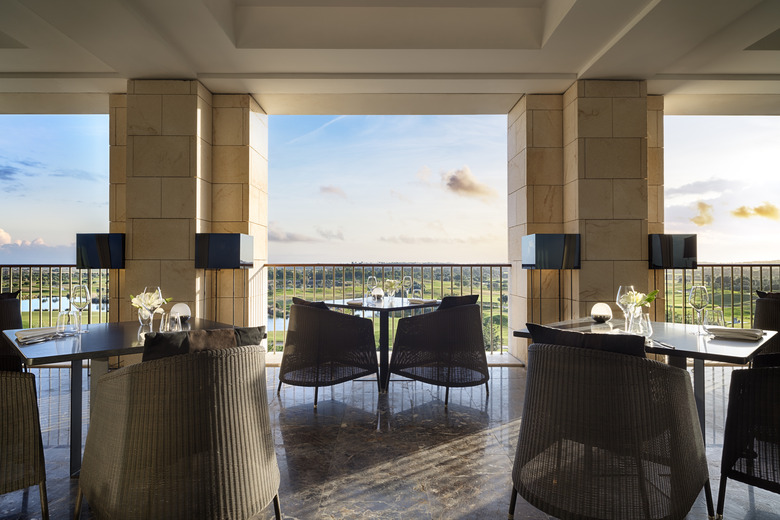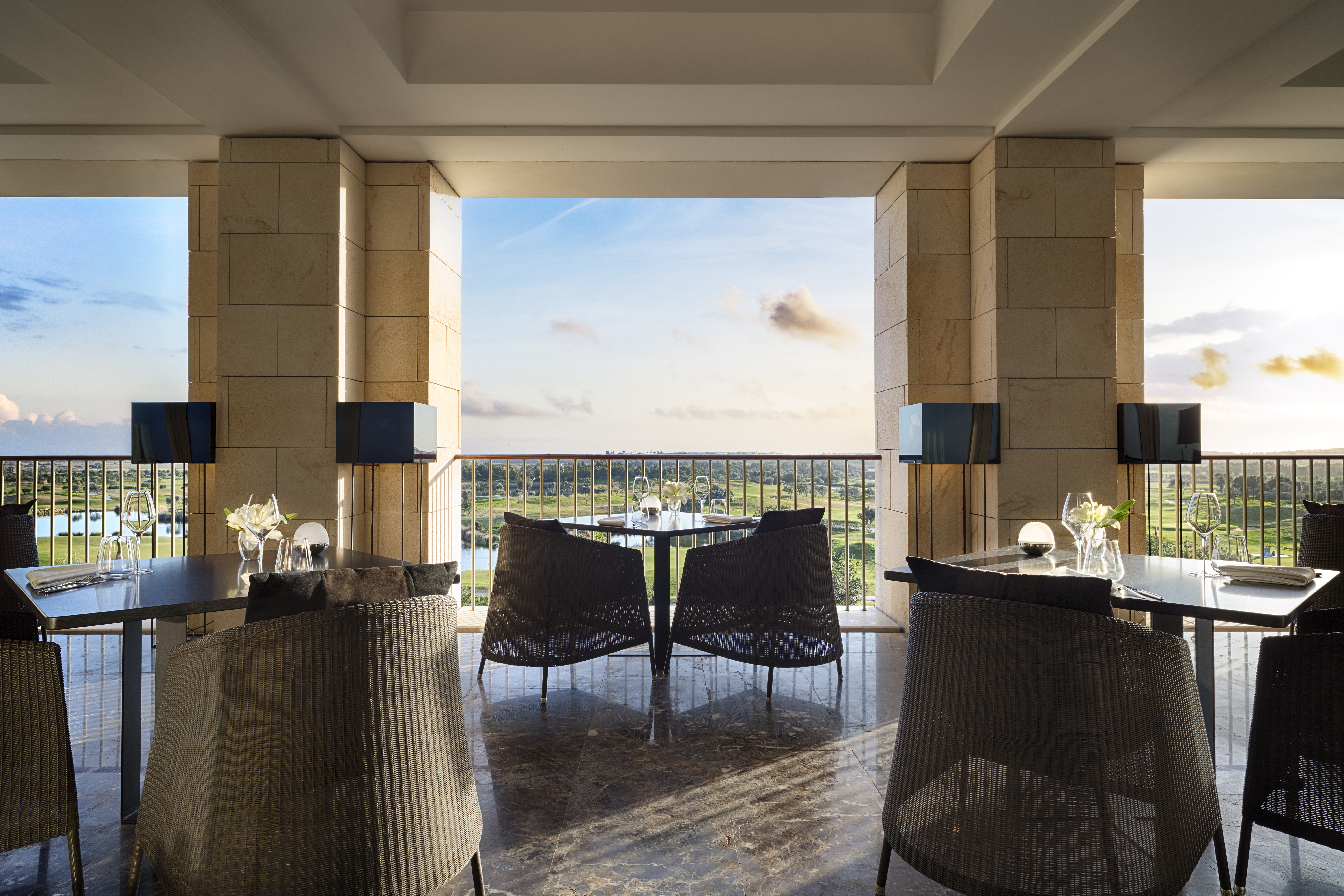Getting A Hands-On Lesson In Portuguese Cuisine
One of the best things about traveling is treating your palate to unfamiliar cuisine. Extra points if you have the privilege of dining at the chef's table at a great restaurant while abroad. But, even better still is getting a chance to learn about the culture and culinary secrets from a local chef.
I had that opportunity in Algarve, Portugal, at the Anantara Vilamoura Algarve Resort, which is on southern Portugal's stunning coast. The Spice Spoon program begins with a market tour in Loule to buy local and fresh ingredients for an authentic Portuguese lunch that you and a handful of people will work together, along with the chef, to prepare.
I was excited about the prospect of going shopping with a chef, watching how they pick and choose at the market, and seeing how they navigate the kitchen. I'm much better at eating fine cuisine than cooking it, so this was going to be a treat. As it turns out, because it was off season, I was the sole student that day. Excitement, turned to nervousness – nowhere to hide, my amateurish skills would be on full display in a one-on-one with the chef.
Fortunately, my fears were unfounded. Within five minutes of meeting the 24-year-old Ivo Pires, a chef de parti at the resort, and seeing his welcoming, boyish grin, I instantly relaxed. He regaled me with his story. He began cooking at 16 and grew up hanging out in the kitchen with his grandmother, mother, and older brother. Cooking is in his blood. After culinary school, he started working at hotels and has been at the Anantara since 2016. He is responsible for food prep in the resort's kitchen and is one step down from a sous chef.
After about a half hour's drive we arrive at the market in Loule. The area is dotted with shops, cafes, and nearby you'll find churches and a thirteen-century castle in an area once settled by the Romans. It's 10 a.m. on a Saturday and already bustling with locals and tourists. Rows and rows of fish, produce, wine, jam, almonds, figs, breads, chili, spices, olive oil, cheese, chorizo, any and everything needed for Portuguese cooking and more.
Pires was like a proud papa showing me all the good stuff at the market. He explained the essential ingredients in Portuguese cooking. "Seafood – clams, oysters, donax clams and cockles – cooked on a griddle or in a frying pan joined by vegetables and fruits whose flavors the sun has made sublime. Some plain barnacles on a beach on the Vicentina coast, clams in a cataplana razor clam rice, whelk bean stew, clam xerém, a stew with maize meal, and seafood açorda, bread casserole, are other examples to make the mouth water." With excitement, he continued, "To stimulate the palate, there's nothing better than a pinch of salt from the region, especially the 'cream' of the salt – salt flower. But any fresh fish, slowly grilled to perfection over charcoal, the way the fishermen do it, can be a veritable food of the gods."
Grilled fish, like sardines dripping on bread or accompanied with a montanheira salad, made with tomato and oregano, are also local favorites. Then there's octopus, which in Santa Luzia, is cooked in various ways – stewed in wine, breaded, grilled, with rice, or simply baked in the oven – as well as squid and cuttlefish. Algarve is a landscape of rolling hills and valleys, dotted with olive, carob, almond, fig, and orange trees, which are all ingredients in local sweets and deserts.
I was at his side, eagerly watching as he went to each vendor. Everyone knew him and he would quietly tell me who had the best and freshest of this and that. He was at home and happy, in his element – a kid in the candy store.
He was clearly a shopping pro, knowing when to snap something up and to walk away. He didn't rush. "The important thing is to know the right places to find the best ingredients. In the local markets we can buy fresh fish from our coast and good quality ingredients from local producers," says Pires.
Establishing relationships with sellers is key. "We have our favorite vendors. We trust them and they do their best to maintain that trust. Even if we don´t buy the cheaper products, we know that we pay for the quality."
Loaded with goodies it was time to return to make the much-anticipated lunch. The menu was intriguing: Appetizers included Bulhao Pato Clams, grilled chorizo, assorted cheeses, bread, olives and shrimp. Tapas are huge in Portugal, and I can see why, a little of this and a little of that, you really don't need a meal. But of course, don't stop there. The entrée was beloved by Pires, the traditional Portuguese dish Cataplana, (fish, claims, shrimp, and potatoes). What makes it special? "Variety, we can do it with meat, fish, vegetables or whatever we want. We can be creative." Dessert was sweet rice pudding.
Of course, Pires moved skillfully in the kitchen, energetic, slicing, dicing, arranging – almost a dance. Totally in love with what he was doing, especially plating. "When it comes to presentation, the secret is knowledge, about the food, the ingredients, their origin and respect for the products we use," says Pires.
I watched, and did my clumsy effort at dicing and slicing cheeses, chorizo, and giving an assist with the rice pudding. Pires just smiled and showed me how to handle the knives. I had an accident while chopping years ago and am a bit phobic about sharp knives. But it was all good. I learned a lot. Mostly, I have even more respect for the folks who turn food into art. Needless to say, the lunch was absolutely fabulous, with wine pairings from start to finish. I was not sorry I was the only student that day.
Pires said what most defines Portuguese cuisine is "its taste and simplicity. We can keep following recipes handed down through generations, or do them in a modern way. But what's most important are the unique flavors."
Pires, who can't imagine not cooking, says, "Cooking a Portuguese meal is all about putting your passion into it."
Back in the United States, we've rounded up 25 of the best classes.

